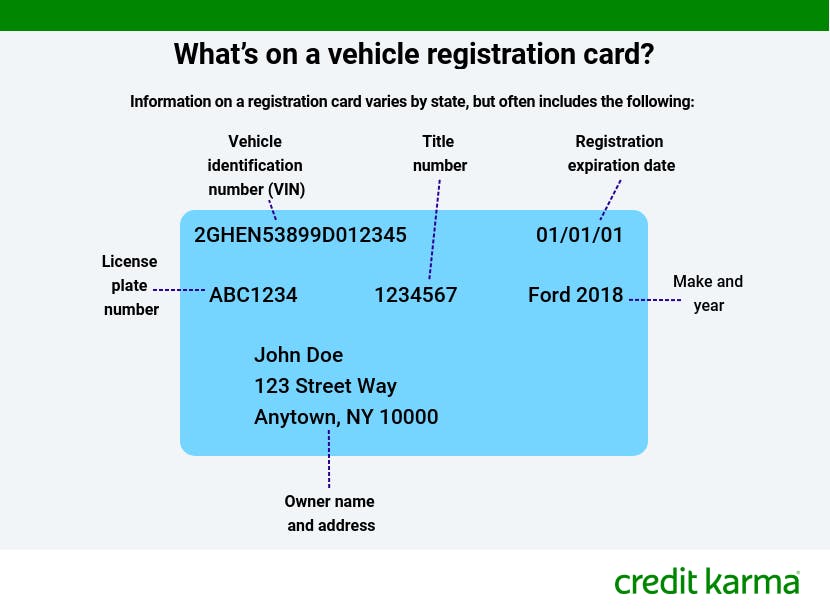In a Nutshell
If you own or operate a car, the state law requires you to get it registered with your state’s Department of Motor Vehicles or transportation agency. The vehicle registration process involves providing some personal information and details on your car and paying a registration fee. If you fail to register your car or renew your registration, you could face penalty fees, a ticket and possibly impoundment.After buying a car, it may seem like your work is done. But one of the most important tasks to tackle afterward is vehicle registration.
Vehicle registration connects a car to its owner. Each state requires you, by law, to get your car registered with your state’s Department of Motor Vehicles (DMV) or transportation agency.
If you allow your registration to lapse or don’t register your car, you could face penalty fees and vehicle impoundment, so you don’t want to drop the ball on this.
Here we’ll review what vehicle registration is and how to get your car registered. We’ll also provide an overview of the paperwork you might need, and review how to get an idea of the cost to register a vehicle.
How vehicle registration works
Depending on the state, you must register a vehicle you own or operate with your state’s DMV or transportation agency. Here are a few common scenarios where you typically need to register a car.
- When you buy a new car: If you buy through a dealership, they’ll usually handle the title and registration for you. But if you buy from a private seller, you will likely need to take care of the registration yourself.
- If you move to a new state: Unless you’re a full-time student or active military, you will need to register your car after you move.
- Annual or biennial registration renewal: Depending on the state you live in, you’ll need to renew your vehicle’s registration every few years — check your state’s law to confirm how often.
The first time you register your car, you’ll receive a license plate for your vehicle and a registration card. Some states also give you a registration sticker that needs to be attached to your vehicle’s license plate or window.
When you renew your registration, you’ll receive a new sticker — if your state issues them —and registration card. Depending on your state’s laws, you may be required to keep the registration card with you when operating your vehicle.
 Image: aaupdateregistration-1
Image: aaupdateregistration-1Stay current to avoid penalties
Vehicle registration needs to be renewed yearly or every few years, depending on the state you live in. And you may need to pay a fee each time you renew the registration.
If your registration isn’t current and you get pulled over, you could get a ticket and have to pay a penalty. Your state’s DMV or transportation agency might also charge penalties for expired registration. Not keeping your registration could lead to problems down the line, and may even cause your car insurance rates to increase.
On top of fees, your car could be impounded. If this happens, the vehicle can be held until all fines and registration fees are paid. You may also have to pay towing and impound fees.
How to register your vehicle
To learn how to register your car in your state, contact your state’s DMV or transportation agency, or visit their website. Registration can usually be handled in person, by mail or online. For first-time registration, some states might require you to handle the process in person.
Documents for vehicle registration
When registering your car for the first time, you’ll need to provide some paperwork. These documents might include …
- Your driver’s license or non-driver identification card
- Proof of insurance, if you live in a state where car insurance is legally required
- Proof of sales tax payment
- Car title, if you own or are financing the vehicle. If the vehicle is leased, you may need to provide a copy of the signed lease agreement.
- Proof that your car has passed a vehicle safety inspection, if your state requires it
- Proof that your car has passed a smog test, depending on the age of your vehicle, in some states
- Vehicle registration application form
For registration renewals by mail, you may need to verify your personal and vehicle information on the renewal form and submit the registration fee by mail along with your paperwork. You might also need to pay any property taxes at that time and pass an emissions inspection or smog test by a specified deadline — which may be outlined on the registration form.
With an online renewal, you might need some or all of the following information on hand:
- Car’s vehicle identification number
- License plate number
- Driver’s license number
- Car insurance details
- Current vehicle registration card
Make sure to check your state’s DMV or transportation agency website to get a full list of what you’ll need to renew your registration.
What does vehicle registration cost?
Registration fees and other charges paid to your state DMV or transportation agency can be used to fund those organizations so they can continue to provide vital services. The income might also help fund city and county services — or the state highway patrol and state highways, too.
These DMV fees differ from state to state, and the way they’re calculated varies.
Some states charge a flat registration fee for all vehicles, while others calculate fees based on a number of factors: The car’s current value, age, weight or fuel efficiency; the total number of cars registered in your name; or even the vehicle’s horsepower.
The differences in the amount charged across various states can be significant. For example, Kentucky drivers could pay around $21 for vehicle registration. But in Montana, you can pay more than 10 times that – $217 – to register a car that’s under four years old.
You can determine registration fees in your neck of the woods by visiting your state’s DMV or transportation agency website. The American Automobile Association (AAA) maintains a chart that provides information on how registration costs are calculated in each state.
Next steps
Getting your car registered for the first time or renewing your registration may seem like a hassle, but completing this on time could save you some serious cash.
Before you head to your state DMV or transportation agency website, make sure you have all the necessary paperwork along with funds for the registration fee and any property taxes. This will help make the process as efficient as possible.
If you haven’t bought your car yet, remember to set aside a little extra money in your budget to cover registration costs.


